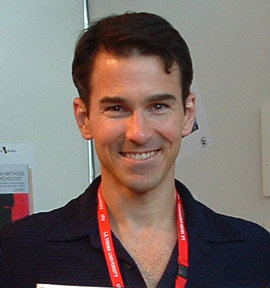Parenting quality not linked to gender or orientation

Paul Hastings had to resort to the Access to Information Act to have his government-commissioned research on families released to the public.
courtesy of Paul hastings
Since Paul Hastings’ literature review concluding that children with gay and lesbian parents have the same levels and quality of social competence as children with heterosexual parents was made public, he’s been receiving a lot of requests for copies.
“Most of the requests have been from advocacy groups, lawyers and groups that promote the rights of families,” said Hastings, who has been in Washington on sabbatical from the Psychology Department. If Hastings had not used the Access to Information Act to release the report, they wouldn’t have known about it at all.
The study was commissioned by the Department of Justice under the Liberal government in 2003, when same-sex marriage rights were a hot topic. The research itself was completed in 2004. Afterwards, the study entered a lengthy process of editing “to make it coherent with the language used by the Justice Department” and then translation.
It was 2006 (the election year, points out Hastings) by the time the document was ready to go. Months went by, and despite repeated emails from Hastings, the report’s findings were not publicized. “It normally does not take more than six months for a completed report to have permission to be on the Justice web site.” Hastings added that posting reports is a matter of course once the translation is available.
Since the research had been commissioned by and was the property of the government, Hastings was not sure of his legal right to disseminate the report. He used the Access to Information Act to make the report public, and received it fairly quickly.
The study itself builds on Hastings’ previous expertise in evaluating social competence in children. The term refers to children’s ability to articulate their needs, to handle conflict and manage reciprocity. In short, it is a measure of children’s ability to work and play well with others. Hastings has been exploring the field as part of Concordia’s Centre for Research in Human Development.
This report systematically compares the results of almost 50 studies of families of gay and lesbian parents and 25 studies of single-parent families with several dozen studies on parenting and socialization involving heterosexual two-parent households.
The studies span the past 30 years in North America, Europe and the U.K. They consistently reported that the sexual orientation of parents had no significant bearing on a child’s level of social competence.
However, the research suggests that “single parents face more challenges than two parents, regardless of gender or orientation.” Parents who do not feel that they have a support system and are socio-economically disadvantaged tend to experience higher levels of stress. Typically, this set of circumstances is more frequent among single parents, but when these challenges exist within two-parent families there are similarly negative impacts on children.
Hastings also said that the existing body of research points to a weakness in medical ethicist Margaret Somerville’s very public argument that children’s right to have one male and one female parent outweighs the rights of same-sex couples. “She suggests that we are walking blindly into something. But gays and lesbians have been raising children for decades. Social scientists have studied these families, and the vast majority of them are fine.”
Hastings said that researching this report, as well as dissertation work on gay, lesbian and bisexual young adults undertaken by his graduate student, Michael Benibgui, has led him to pursue further research relating sexual orientation to wellbeing.
He is co-investigator on a CIHR-funded project led by Danielle Julien at UQAM exploring stress levels for gays and lesbians who are also part of ethnic and cultural minority groups.
In addition, through three other CIHR grants, he is researching children’s development of empathy and aggression, and is co-investigator on Alex Schwartzman’s project examining three generations of east-end Montreal families (the Journal, Feb. 22), and on a project with Rosemary Mills at the University of Manitoba comparing social competency and anxiety in children here and in Winnipeg.